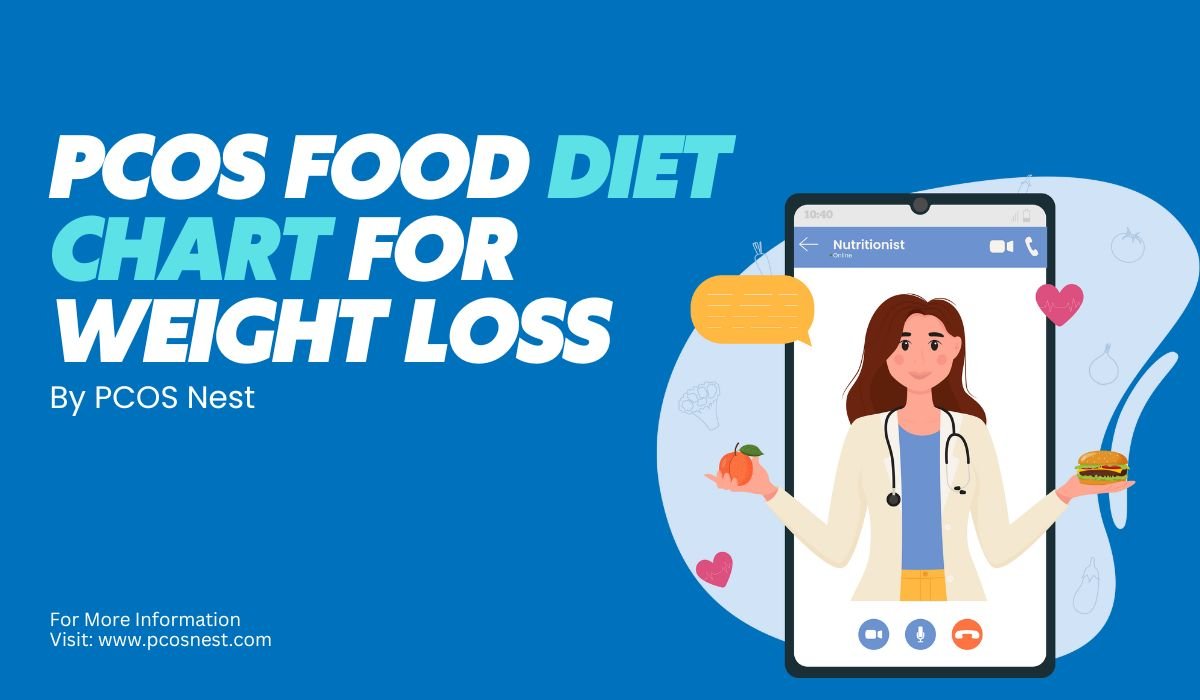Dealing with PCOS can feel overwhelming, especially when it comes to figuring out what foods help you feel your best. The right diet can make a huge difference in managing symptoms by stabilizing hormones.
So PCOS Nest team has designed a PCOS food diet chart that will help in weight loss and provide balanced nutrition to avoid feelings of weakness or fatigue. With approximately 1,000 calories per day, the plan includes low-carb, nutrient-dense meals that help regulate blood sugar levels and improve insulin sensitivity, which are essential for managing PCOS symptoms.
PCOS Food Diet Chart:
Each meal includes lean protein, healthy fats, and fiber-rich vegetables, all of which work together to keep you satisfied and energized throughout the day.
This 10-day diet plan will help you lose 0.5 to 1 kg (1 to 2 pounds) per week. However, weight loss depends on your starting weight, metabolism, physical activity level, and how consistently you follow the plan. Follow this diet plan until you achieve your ideal weight.

Tips:
- Drink plenty of water at least 3 liters daily, about 13 cups. According to studies, drinking 3 to 4 liters of water daily gives you glowing skin (helps in curing PCOS acne) and strengthens your immune system. It also helps with digestion and overall energy levels.
- If you feel consistently low on energy, you might need to slightly increase your calorie intake with more protein or low-carb vegetables.
- Also consult your doctor about supplements, especially vitamin D, magnesium, or B vitamins, which are beneficial for PCOS and may be hard to get in low-calorie diets.
- If you are thinking of following this diet plan for an extended period, then it would be very good to consult with your nutritionist who will ensure the plan is safe and suitable for your personal health needs.
Also Read: How I Lost Weight with PCOS
Frequently Asked Questions:
Why is a PCOS-specific diet important?
PCOS is often linked to insulin resistance, hormone imbalances, and inflammation, which can make weight management difficult. A PCOS-friendly diet helps stabilize blood sugar, reduce cravings, and support weight loss, which can improve PCOS symptoms and hormonal health.
Can I drink milk in PCOS?
If your testosterone or androgen levels are high, then you should avoid milk or other dairy products completely. Some studies suggest that non-fat dairy can increase androgen and insulin levels, which are already high in women with PCOS. Too much milk may worsen symptoms like acne. Additionally, women with insulin resistance often have lower vitamin B12 levels. However, not every woman with PCOS needs to avoid dairy entirely.
What foods are recommended in a PCOS diet chart?
The following foods are recommended in the PCOS diet chart:
1. Lean proteins (chicken, turkey, tofu, fish)
2. Healthy fats (avocado, nuts, olive oil)
3. Low-glycemic carbs (whole grains, quinoa, leafy greens)
4. Fiber-rich vegetables (broccoli, spinach, peppers)
5. Antioxidant-rich foods (berries, green tea) These foods help stabilize insulin, reduce inflammation, and promote fullness.
Are there foods I should avoid with PCOS?
Yes. Foods that may worsen PCOS symptoms include:
1. Refined carbohydrates (white bread, pastries)
2. Sugary snacks and drinks (soda, candy)
3. Processed foods (packaged snacks, fast food)
4. Trans fats (fried foods, hydrogenated oils) These foods can lead to blood sugar spikes, promote inflammation, and may make symptoms harder to manage.
Can I eat Maggi in PCOS?
No. Maggi, like many instant noodles, is not the best choice for managing PCOS, as it is high in refined carbs, sodium, and unhealthy fats. These ingredients can lead to blood sugar spikes, inflammation, and weight gain, which can worsen the PCOS symptoms.

